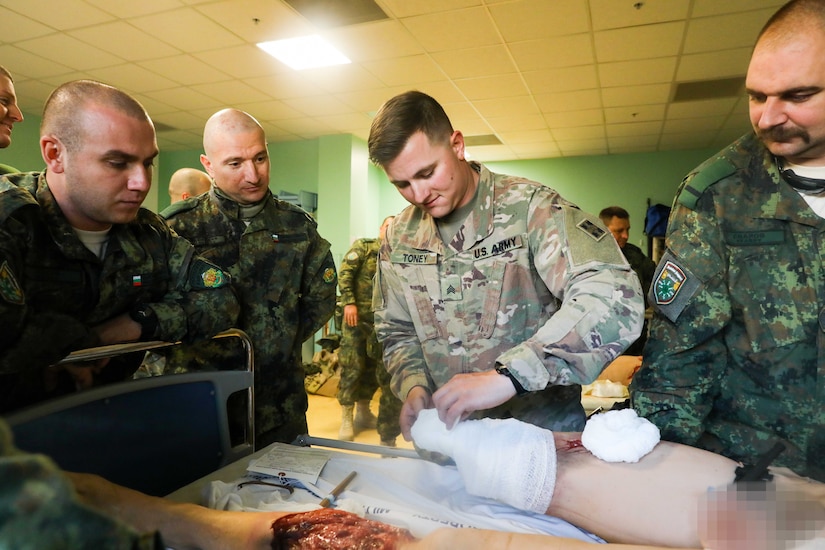KANDAHAR AIRFIELD, Afghanistan -- The training scenario: an
explosion at an entry control point severely injures two service members and
first responders must react quickly to save lives.
Army Sgt. James Toney, a health care noncommissioned officer
with 1st Battalion, 12th Infantry Regiment, 2nd Infantry Brigade Combat Team,
4th Infantry Division, employed that scenario to begin his tactical combat
casualty care training course.
The training consisted of three phases: care under fire,
tactical field care
and tactical evacuation care, Toney said. “The primary focus
is to teach first responders how to tactically advance up to a casualty, treat
them and evacuate them within a tactical situation,” he said.
Toney said he and his team are training Afghanistan-deployed
Bulgarian service members. Bulgaria is a member of NATO.
“We have trained over 80 Bulgarian military members since
arriving [in Afghanistan],” Toney said. “There is a bit of a language barrier,
but they are eager to learn the material.”
‘The Wounds Look Realistic’
During the training, Toney said, he and his soldiers employ
specially prepared mannequins as mock casualties to help make the scenarios as
realistic as possible.
“The wounds look realistic and disgusting, but it’s very
helpful for my soldiers to see,” said Bulgarian army 1st Sgt. Nikolov Ivaloyo.
“It’s important that my soldiers know how to treat every type of wound and to
see how it could potentially look, so that if or when something happens, it’s
not a complete shock.”
Ivaloyo and his troops conduct base patrols and operate
entry control points.
“My soldiers have to inspect vehicles that come onto the
base, and anything could happen during those inspections,” said Bulgarian army
Command Sgt. Maj. Petar Simeonov. “They need to be prepared to provide aid to
anyone who could possibly get hurt and the [2nd IBCT] medics are ensuring we
are ready to do so.”
Since arriving to Kandahar Airfield in May, Simeonov said,
the U.S. soldiers have been extremely helpful in training his soldiers, and he
added that he’s grateful to have knowledgeable instructors.
“The instructors are always well prepared to teach the class
and always set aside time at the end for any questions my soldiers might have,”
Simeonov said. “They always go above and beyond to ensure we understand the
material they are teaching us, which is important to the readiness of our
soldiers.”
Toney said he enjoys working with coalition forces and feels
like he is contributing to the overall Army mission by helping to enhance the
capabilities of the NATO forces on the airfield.
“I enjoy training and teaching others, and I’ve enjoyed
having the opportunity to teach our allied forces,” Toney said. “I believe that
with each group that comes in to train, they are understanding more and more
the importance of what my soldiers and I are teaching them.”







No comments:
Post a Comment